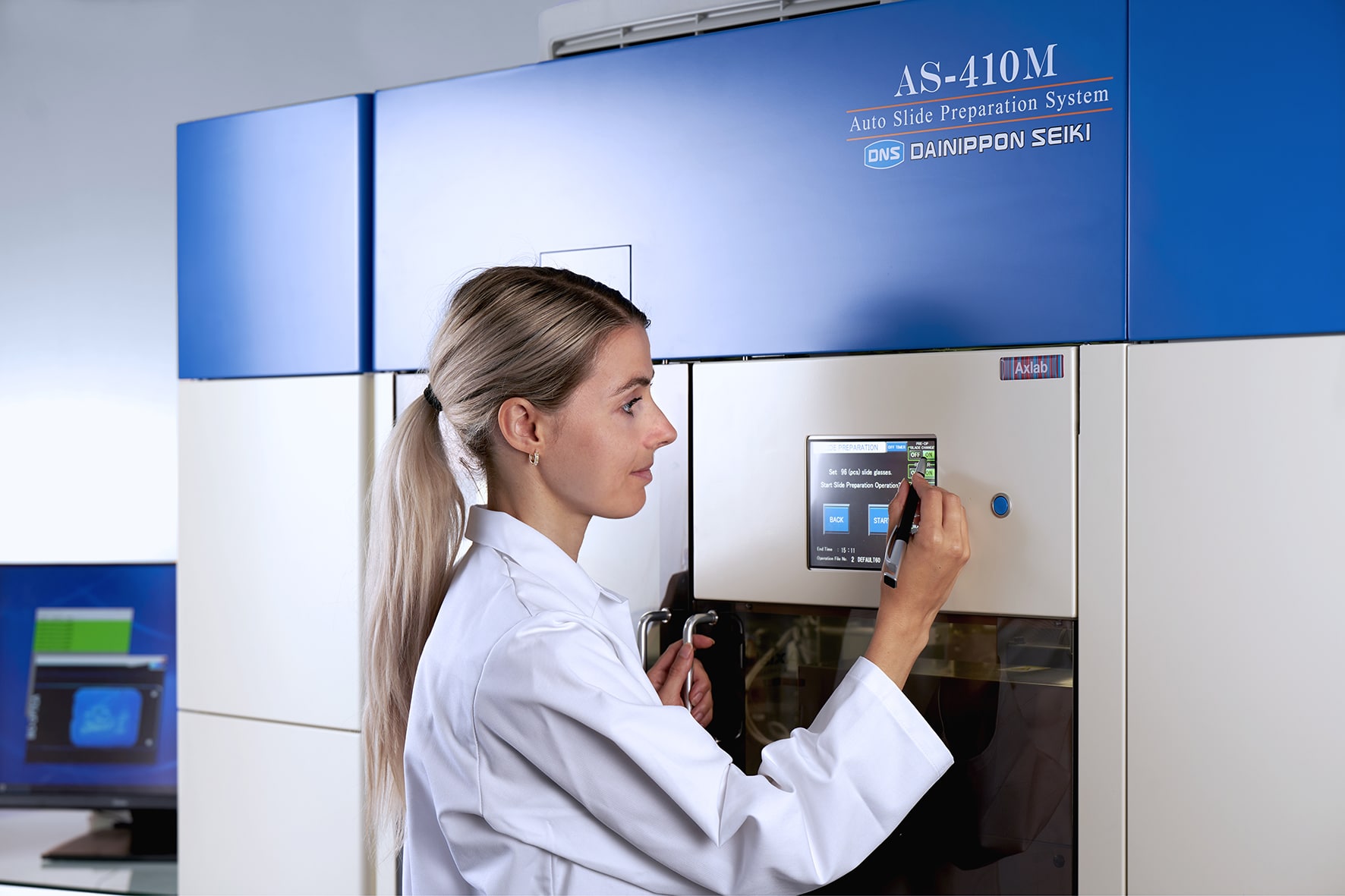Things have moved fast for the Danish laboratory supplier Axlab. Established in the UK in 2022, the company has today a local sales team of six employees.
‘We have fully met our expectations. In terms of sales, we are satisfied and employee-wise, it has been beyond our expectations. We can only be grateful and happy with the outcome England has provided us so far,’ concludes Lotte Holst, CFO at Axlab.
In 2022, Danish Axlab chose to expand its business in the UK. More and more people become ill with cancer and other diseases that need to be examined and diagnosed. The UK has a much larger population than Denmark and significantly more laboratories and thus a greater need to have tissue samples analysed quickly and efficiently. This, combined with a market readiness for automation, has led to the outcome.
“Timing was right for the market. We have also become the exclusive distributor for several products in the UK and elsewhere,” says Lotte Holst.
Full VAT on gods
Like many other Danish companies, Axlab has also experienced challenges in establishing itself in the UK due to Brexit. There have been challenges with importing goods, which required lengthy dialogue with the authorities.
“It’s been difficult to get goods into the country quickly, as we had some initial difficulties getting the right VAT number and had to pay the full VAT. So it was definitely necessary to have local partners who could help. Once we got a handle on the VAT number and documentation, it was easier. At the same time, we increased our team in Denmark to provide support and admin. In this way, everything has become easier to manage over time,” says Lotte Holst.
Successful recruitment
Axlab needed to quickly hire a sales team with solid industry knowledge. Therefore, in an early phase, they hired a recruitment agency to help find candidates. It has gone far better than expected, as there are many skilled candidates in the field in the UK.
“We’ve been incredibly lucky to get some talented employees in the UK who can execute the strategy we want to deliver. So, in that sense, it has worked out very well,” says Lotte Holst and adds that internally, they value the company culture:
“We look after each other and our wellbeing. It must be felt throughout the entire organisation. So when we’re in a recruitment process, candidates can often feel it. Our team in the UK has embraced the culture really well from the start. We are proud of that,” says Lotte Holst.
She emphasizes that one of the things they have done well in Denmark is to deliver an extremely high level of customer service, and the sales team won’t let a customer go once they have made a purchase. It has been crucial that this culture also became part of the mindset of the new team in the UK.
The goal is not achieved in “just 5 minutes”
After two years in the UK, Axlab takes stock and feels confident about the future.
“We have reached the milestones that we set. Not as fast as we would have liked. But it’s a classic pitfall to think that you can break all sales records in ‘5 minutes’ once the sales team is in place. We operate in a market for large instruments in healthcare, where the sales process is especially complex. It takes time and patience. The UK is an important market for us, and we are very optimistic about the future,” emphasizes Lotte Holst.

4 tips for setting up in the UK
Lotte Holst is CFO at Axlab and offers four tips for entering the UK market.
1) Get a partner in the UK from the beginning
It hasn’t become any easier to establish a business after Brexit, as it requires a lot of documentation and dialogue with the competent authorities. Therefore, it is my clear recommendation to get a partner in the UK who can help you through the entire establishing process.
CPIE Services helped with setting up a bank and a VAT number, among other things. They have also handled the dialogue with the official departments. Axlab also got in touch with a local accountant and had help with payroll and finding a logistics partner.
“We would never have been able to do it without CPIE Services. It would not have been possible. They have been very good in many areas.”
2) Research the market thoroughly before you start
To venture into a new market, it is of course crucial to establish whether there is a basis for a profitable business.
Once you’ve made the decision, make sure you have agreements in place as early as possible. Make sure you have the capacity to enter a new market and most importantly: Have lots of patience. Things take time – and often a little longer than expected. Moving into a new market just isn’t done in ‘5 minutes’.
3) Find the right candidate
Finding the right candidates to represent your company locally is crucial to ensure you get off to a good start. Make sure you find the right match from day 1 – maybe through a recruitment agency.
Also, you should not underestimate the importance of making new colleagues in the UK feel a part of the whole organisation. Do everything you can to allocate enough resources in Denmark to support a new remote team. We saw that the UK sales team was perhaps not supported as well as they should have been during busy periods due to our workload.
4) Ensure adequate resources are allocated at head officer
I don’t see that the UK market is that much harder to enter than other countries. But it requires allocating time and resources to the task. This is extremely important. It’s not just something you do alongside your regular work. We, like many others, have been through frustrating periods where we haven’t had the necessary capacity. In short, setting up can be done faster, better and more efficiently if the resources are allocated from day 1.

About Axlab
Axlab is a Danish company that has supplied advanced technical equipment to hospitals and laboratories in Europe, the UK and the US since 1993. In 2022, Axlab founded a subsidiary in the UK.
At Axlab, it is important to be close to everyday life in the laboratory and in the pathology departments of hospitals. This provides valuable knowledge that forms the basis for advanced technological solutions that increase efficiency in the laboratory, ensure an optimal working environment and high-quality analyses for the benefit of patients and employees.






